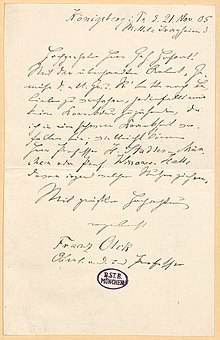Otto Crusius
Otto Carl Friedrich Hermann Crusius (born December 20, 1857 in Hanover , † December 29, 1918 in Munich ) was a German classical philologist who held chairs at the universities of Tübingen, Heidelberg and Munich.
Life
Otto Crusius was the only child of the Hanoverian consistorial auditor Otto Carl Siegismund Crusius (1794–1861) and his second wife Sophie Charlotte Elisabeth born. Winkelmann (1825-1900). His paternal family list is with his ancestor Balthasar Crusius (1550-1630). After attending school in Hanover , he studied in Leipzig from 1875 to 1879, among others with Friedrich Ritschl and Otto Ribbeck , and received his doctorate there in 1879 with a thesis on Babrios . In 1880 Crusius became a senior teacher at the Royal High School in Dresden. In 1883 he completed his habilitation in Leipzig on Greek proverbs and in 1885 became a teacher at the St. Thomas School in Leipzig .
In 1886 Crusius went to Tübingen as professor and successor to Erwin Rohdes and in 1898, again as Rohdes successor, moved to Heidelberg University , and in 1903 to Munich University (successor to Wilhelm von Christ ). A bronze bust of Karl Baur is on display today in the Department of Classical Philology at the University of Munich .
In the year he was called to Munich, Crusius was elected an extraordinary member of the Bavarian Academy of Sciences , followed in 1905 as a full member; In 1915 he became president of the academy. He was also a corresponding member of the Vienna Academy of Sciences and an honorary doctorate from the Universities of Dublin and Athens . In 1910 he received the Bavarian Maximilian Order for Science and Art .
In 1889 Crusius became editor of the journal Philologus . Starting in 1909, he edited Friedrich Nietzsche's philological works for the Nietzsche Archive , succeeding Ernst Holzer, together with Wilhelm Nestle . In 1902 he published a biography of Erwin Rohde, who had dealt with, among other things, Greek fables and proverbs, Greek poetry and ancient music.
Crusius signed the appeal for the founding of the German Fatherland Party , a right-wing extremist group that formed in 1917 during World War I and that opposed peace negotiations and sought plebiscite military rule. He himself was a member of this party and author of war songs.
In 1885 he married Franziska von Bihl (1858–1939), with whom they had three children: Elisabeth (1886–1970), Otto Eduard (1892–1965) and Friedrich (1897–1941).
His estate is in the Bavarian State Library .
Fonts (selection)
A comprehensive list of Crusius' works with digital copies can be found on the Wikisource author's page .
- On the history of Greek religion. 1886.
- Investigations on Herondas. 1892.
- Friedrich Nietzsche : Unpublished information on literary history, rhetoric and rhythm. Edited by Otto Crusius. 1912.
literature
- Karl Preisendanz : Otto Crusius. In: Biographisches Jahrbuch für Altertumskunde. Vol. 40, 1920, pp. 1-57 (digitized version ) .
- Rudolf Pfeiffer : Crusius, Otto. In: New German Biography (NDB). Volume 3, Duncker & Humblot, Berlin 1957, ISBN 3-428-00184-2 , p. 432 ( digitized version ).
- Franz Kössler: Personal dictionary of teachers of the 19th century. Giessen University Library, Giessen Electronic Library, 2008, preprint, p. 84, ( online )
Web links
- Literature by and about Otto Crusius in the catalog of the German National Library
- Overview of Otto Crusius's courses at the University of Leipzig (winter semester 1883 to summer semester 1886)
- The correspondence between Eduard Meyer and Otto Crusius (1885–1918) in the DFG project "Processing of important letters from the Eduard Meyer estate "
- Franz Brümmer's estate with a biographical report by Otto Crusius
- Otto Crusius in the Bavarian Musicians' Lexicon Online (BMLO)
- The estate of Otto Crusius in the Bavarian State Library (with a picture of the bust of Karl Baur )
Individual evidence
- ^ Member entry of Otto Crusius at the Bavarian Academy of Sciences , accessed on January 21, 2017.
- ↑ See the article on the party in the Historisches Lexikon Bayerns .
- ^ Catalog entry in the repertory
- ^ The Almanac of the Royal Bavarian Academy of Sciences for the 150th Foundation Festival in 1909 contains a printed bibliography . Munich 1909, pp. 205–216 (digitized version ) .
| predecessor | Office | successor |
|---|---|---|
| Karl Theodor Ritter von Heigel |
President of the Bavarian Academy of Sciences from 1915 to 1918 |
Hugo Ritter von Seeliger |
| personal data | |
|---|---|
| SURNAME | Crusius, Otto |
| ALTERNATIVE NAMES | Crusius, Otto Carl Friedrich Hermann (full name) |
| BRIEF DESCRIPTION | German classical philologist |
| DATE OF BIRTH | December 20, 1857 |
| PLACE OF BIRTH | Hanover |
| DATE OF DEATH | December 29, 1918 |
| Place of death | Munich |


